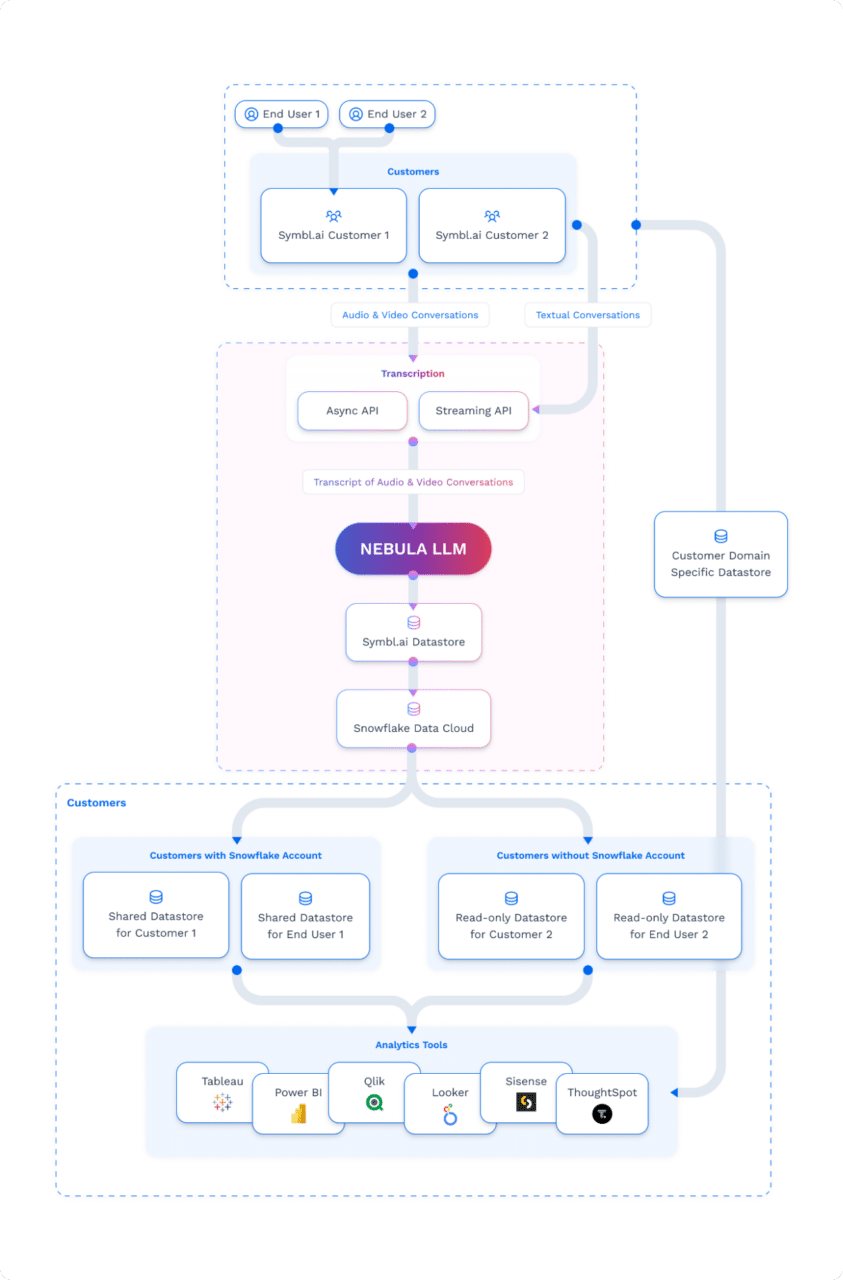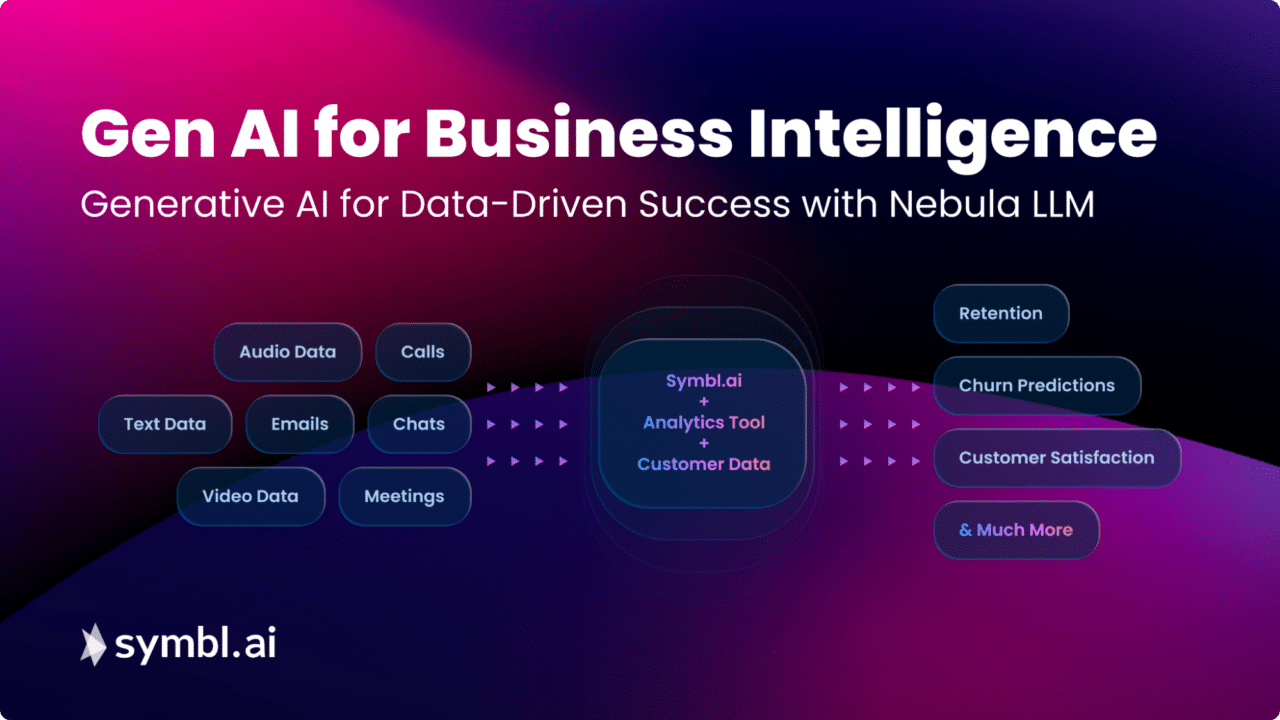In today’s fast-paced business landscape, harnessing the power of data is crucial for making informed decisions and driving growth. One of the cornerstones of this endeavor is the strategic utilization of Symbl.ai’s Generative AI powered by Nebula LLM—a treasure trove of customer sentiments, and interactions. Symbl.ai’s Generative AI goes beyond traditional analytics NPS/CSAT/CES scores by meticulously parsing through customer dialogues across a multitude of channels—calls, emails, chatbots, social media—to derive valuable insights such as customer sentiment, preferences, and areas of concern. By analyzing the sentiment, tone, and content of these interactions, businesses can understand customer needs, preferences, and pain points more effectively. This blog talks about how Symbl.ai propels businesses’ decision making with Generative AI.
The challenge
Lack of Understanding Reasoning: Modern businesses understand the importance of Generative AI as they provide an understanding of ‘What’, ‘Why’, and ‘How’ for customer interactions. However, managing insights from Generative AI can be a challenge due to its structure, volume and evolving capabilities.
Complexities in Data Sharing: In today’s business landscape, not only understanding ‘What’, ‘Why’, and ‘How’ is key but sharing the knowledge and accurate data delivery in a timely manner is important for informed decision-making. However, challenges such as outdated data architectures, the spread of isolated data repositories, and the increasing variety of data formats in different teams in an enterprise hinder this process of sharing insights within the organization. Simplifying data pipelines and infrastructure is essential for businesses to efficiently unlock the value of their data.

Understanding Reasoning with Nebula LLM
Nebula is a specialized large language model developed by Symbl.ai, designed to handle generative tasks in human conversations. It excels in capturing the subtle details of human conversations providing a reason of ‘What’, ‘Why’, and ‘How’ for customer interactions. Click here to learn more about Nebula LLM.
Generating Insights from Nebula LLM
Nebula LLM is available via an API. It accepts inputs in a prompt format containing the human conversation in a textual format and an instruction of the desired output. If you have a transcript of the conversation between the customer and the representative or other personas along with an instruction, Nebula understands the conversation and based on the instruction a response is provided. To learn more about designing a prompt, click here.
If you do not have the transcripts or the conversations in a textual format, not to worry. You can utilize Symbl.ai’s Async API and Streaming API to process audio and video conversations, and provide an API response in JSON format and a transcript format which you can pass to the Nebula LLM.
Managing data pipelines
Businesses who want to analyze conversations, start processing conversations with Symbl.ai’s Nebula LLM and get the insights via APIs. But parsing the data from APIs, building the data pipelines (can be batch or real-time) to take the insights from APIs, adding to data stores and sharing data is an extra effort for businesses which needs technical expertise and time. In an enterprise setup, as mentioned in the challenge, there could be multiple teams where each team has their own data and uses a different set of tools from others. To share insights across teams it involves ETL to a single data warehouse, providing and tracking access for batch data for processing, and for real-time data streaming services such as Kafka, PubSub, Kinesis are to be used. Similarly, enterprises need to build and manage data pipelines to share insights with customers. To handle these operational tasks, enterprises need data engineering teams and a significant amount of time and money.
Conversation Business Intelligence
Symbl.ai’s conversation business intelligence eliminates the need for businesses to put time and effort into building and maintaining data infrastructure. Conversation business intelligence offers a no-code solution where all the insights generated from Nebula LLM is available to businesses in a datastore. Symbl.ai does this by managing all the integration process building pipelines, cleaning and storing data in datastores such as Snowflake data cloud, Google BigQuery and AWS Redshift. With this businesses can save time and money from building POCs, developer effort and not bothering about maintaining infrastructure, rather than focus more on performing data analysis to understand root-cause for users problems and providing better user experience.

Embrace the Data-Driven Excellence with Generative AI Insights. With Symbl.ai:
Eliminate Manual Data Management: Automate the entire process of conversation data collection, cleaning, and storage.
Gain Real-Time Insights: Leverage real-time and batch data pipelines to make informed decisions on the fly.
With all the insights available to businesses readily in the data stores, businesses can connect data stores with their preferred analytics tools such as Tableau, Looker and Power BI, Qlik, Sisense, ThoughtSpot with their in-built connectors, and query all the Generative AI insights associated with their account. Not only connect with analytics tools, enterprises can also connect these insights to their machine learning models and train models, for example to identify churn more accurately.
Symbl.ai’s transformative approach shapes an ecosystem known as Conversation Business Intelligence. This ecosystem revolutionizes how businesses leverage Generative AI insights, seamlessly integrating them into existing data stores and analytics platforms. This helps businesses identify the root cause of customer attrition, analyze customer experience during the journey, and helps in formulating and delivering strategies for exceptional customer satisfaction.
With Symbl.ai as the orchestrator of data integration, businesses can focus on what matters most—interpreting insights, optimizing strategies to retain customers and enhancing customer experiences. Thinking about getting started? Here is the step-by-step guide on how to build a Business Intelligence solution with Nebula.
